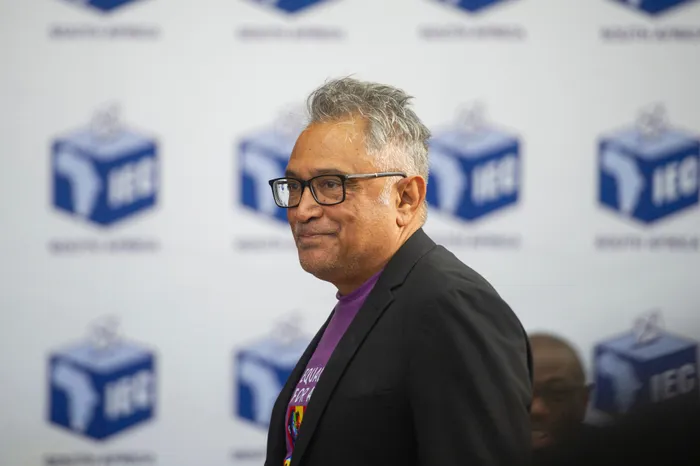Will South Africans vote with their hearts or their minds?

Zackie Achmat is standing as an Independent candidate in the 2024 elections. The IEC in the Western Cape hosted the signing of the Electoral Code of Conduct Pledge by parties and independents contesting the Western Cape regional and provincial seats for the National and Provincial Elections. This election is hard to predict with support for the ANC and the DA declining in recent elections, the writer says. – Picture: Armand Hough / Independent Newspapers / April 18, 2024
By Bheki Mngomezulu
As the date of the 2024 general elections comes closer, many pertinent questions are surfacing.
Topping the list is: Which political party will win this election? The second question is: As independent candidates will be contesting this election for the first time, what impact will they have?
Unlike with previous elections since 1994, when the victory of the ANC was a certainty, except for the percentage which could be determined only after the counting was done, this year is different. No party is guaranteed a victory. This makes the 2024 elections interesting.
First, voters are spoilt for choice, given the unprecedented high number of political parties. Had some not been disqualified for having failed to meet the Electoral Commission of South Africa’s requirements, the number would have been even higher.
The fact that independent candidates will also be contesting the election means that the electorate will have additional choices.
Another factor which makes this election hard to predict is the fact that support for the ANC and the DA has been declining in recent elections. This makes the two biggest parties restless too. On the other hand, the support enjoyed by parties such as the EFF, IFP and Freedom Front Plus has been on an upward trajectory in successive elections. However, none of the parties has grown enough to be able to replace the ANC single-handedly.
What is noticeable about the ANC is that its wounds are self-inflicted. The party has been digging its own political grave through factional politics, complacency, service delivery challenges, failure to listen to advice provided by various sections of society, and reckless public statements and actions that push potential supporters away.
The calibre of the ANC leadership at national and provincial levels has been seriously criticised by many South Africans.
Questions have constantly been asked if the leadership is equal to the task in addressing endemic challenges facing the country. Issues such as the energy crisis, weak economy, increasing unemployment rate, excessively high crime rate figures and increasing socio-economic inequalities are some of the issues that have tarnished the ANC’s political image. How the party has responded to the challenges has also been cause for concern to many voters.
Exogenous causal factors have also contributed to and irrefutably compounded the political suicide outlined above. The factors include the global economic meltdown, the Covid-19 pandemic and global political turmoil epitomised by events such as the Russian invasion of the Ukraine, Israeli invasion of Palestine and many others.
The sin of incumbency has resulted in the ANC, as the governing party, taking the blame for the negative impact of the global developments.
Given the picture painted above, will South Africans vote with their hearts or their minds?
The question is important because it assumes two things. First, it assumes that there are voters who simply love their political parties no matter what. Such people will vote for their traditional parties, regardless of how those parties are run or how they are performing in terms of serving the public. Such voters are bound to vote with their hearts which are attached to their political parties – whichever they might be, not just the governing party, the ANC.
Second, the question assumes that some among the electorate would use their minds to guide them on how to vote or which party they would be willing to put their weight behind. This group of voters will probably consider the factors enumerated above and assess each party based on its performance to date. Depending on the conclusions they draw about each party, they would then decide how to vote.
I should briskly state that the point above should not be misconstrued to be solely directed at the ANC as the governing political party at the national level. All 14 political parties that are represented in the National Assembly will be subjected to the same scrutiny. What will differ is the magnitude of such scrutiny.
Surely the ANC would be the main victim because it is the governing party? The DA would be subjected to the same assessment based on its performance in the Western Cape where it has been governing for some time.
As for the other smaller parties represented in the National Assembly, the question would be asked about whether they have played their oversight role or if they have colluded with the bigger parties.
While this is the national and provincial election, some voters might judge political parties based on their performance at the local sphere of government. Not all voters draw a distinction between a general election and a local government election. This means that some parties might suffer the consequences of failing to deliver services at local government level.
Drawing from the discussion above, the decision on who to vote for is not simple. There is more to it than meets the eye. Some voters will follow their hearts and ignore the realities mentioned above. Others will use their minds and even ditch their political parties to give others and independent candidates a chance.
Some voters will go to the voting stations having not decided who to vote for. These might be influenced by other voters on the day and vote by persuasion without following their hearts or their minds.
Professor Bheki Mngomezulu is Director of the Centre for the Advancement of Non-Racialism and Democracy (CANRAD) at Nelson Mandela University